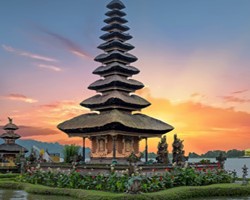-
Second Announcement of 2019 IERE-PLN Bali Workshop
Date posted:
-
-
-
Post Author
Lucy StrakerIFRF Administration & Communication Coordinator
-

IERE is hosting the ‘Smarter and Cleaner Electricity for Better Life’ workshop at the Ayodya Resort Bali, Indonesia on 11-14 March 2019.
The keynote speakers have been confirmed as Dr. Sung Hwan Bae (KEPCO, Korea) and Prof. Mukhtasor (Coordinator of Post Graduate Program in Marine Resources Management, Sepuluh Nopember Institute of Technology, Indonesia).
Programme schedule:
11th March 2019 – Welcome reception
12th March 2019 – 2019 IERE-PLN Bali Workshop (Day 1); Official Dinner
13th March 2019 – 2019 IERE-PLN Bali Workshop (Day 2); Social Event (Optional)
14th March 2019 – Technical Visit (Optional)
The sessions outlined for this event are:
Session 1: Advanced Metering Infrastructure (AMI)
Utilities today are seeking ways to enhance energy efficiency, reduce costs and improve customer service. One strategy is to deploy an advanced metering infrastructure (AMI). However, installation and execution are still challenging. Implementing AMI is a complex undertaking involving multiple technologies. This session will discuss about all content of AMI and its implementation strategy. Potential topics include:
- Smart meter
- Communication protocol and technology
- Meter data management system
- Security issues and challenge
- AMI implementation strategy etc.
Session 2: Renewable Energy Grid Integration
To foster sustainable, low-emission development, many countries are establishing ambitious renewable energy (RE) targets for their electricity supply. Because RE especially solar and wind tend to be more variable and uncertain than conventional sources, various technical and economic issues occur in the integration of these resources into a grid. Technical problems arise in the areas of power quality, voltage stability, harmonics, reliability, protection, and control. The session will investigate the possible solutions for those issues and other related challenges. Potential topics include:
- System flexibility
- Storage system and technology
- Stochastic modelling
- Demand side management
- Hybrid system etc.
Session 3: Distributed Power Generation
Environmentally friendly renewable energy technologies such as photo-voltaic and clean, efficient, fossil-fuels technologies such as micro-turbines and fuel cells are among new generating systems driving the demand for distributed generation of electricity. The smallness of these new distributed generations along with the low voltages at the interface creates a new class of problems which requires innovative approaches to managing and operating the distributed resources. This section will explore about the role of distributed power generation for electrifying community and all related issues. Potential topics include:
- Solar photovoltaic panels (solar farm, PV rooftop)
- Small wind turbines
- Micro gas fired (turbines/engines)
- Fuel cells using by natural gas or biomass
- Reciprocating combustion engines etc.
Session 4: Electric Vehicle (EV) Infrastructure
The development of electric vehicle has been over a hundred years but failure to gain the public acceptance in various stages due to various reasons. Therefore, widespread electric vehicle adoption requires a supportive ecosystem of stakeholders including utilities, government, vehicle OEMs, charging providers, interest group and drivers. With the correct policy and government help and advancement of electric vehicle technology, the prospect of Electric Vehicle will be bright and the focus point of future development. The session will elaborate those issues and the following potential topics:
- Standard and type of charger
- EV business model
- E-mobility concept and model
- EV infrastructure development strategy etc.
Session 5: Advanced Thermal Power Generation
Although the renewable energy has emerging globally yet the energy supply in the world is still mostly produced by thermal power generation. To move toward a cleaner energy economy, improvements of emission reduction technology are needed, as well as construct the smart system overcoming the intermittency of renewable electricity penetration. Additionally to achieve higher efficiency and reliability, modernization of thermal power plants has been conducted through utilization of advance management and digital technology.
Potential topics include:
- Thermal power plant flexibility
- Status of emission reduction technology (e.g. Carbon capture storage, Clean coal technology etc.)
- Asset management on power generation
- Artificial intelligence and Data analytics of thermal power plants.
- Other green thermal power plants recent issues (e.g. Geothermal, Bio mass to energy etc.)
Full details and registration for this event can be found here.
